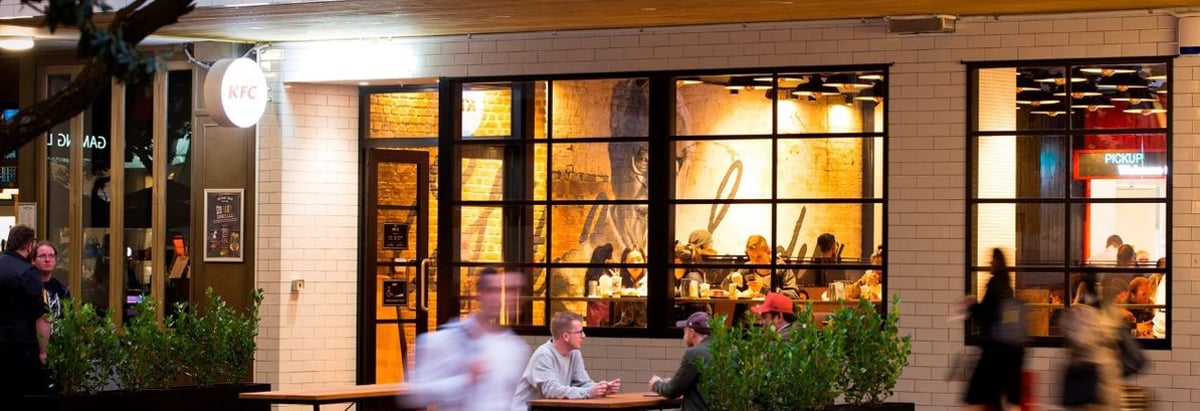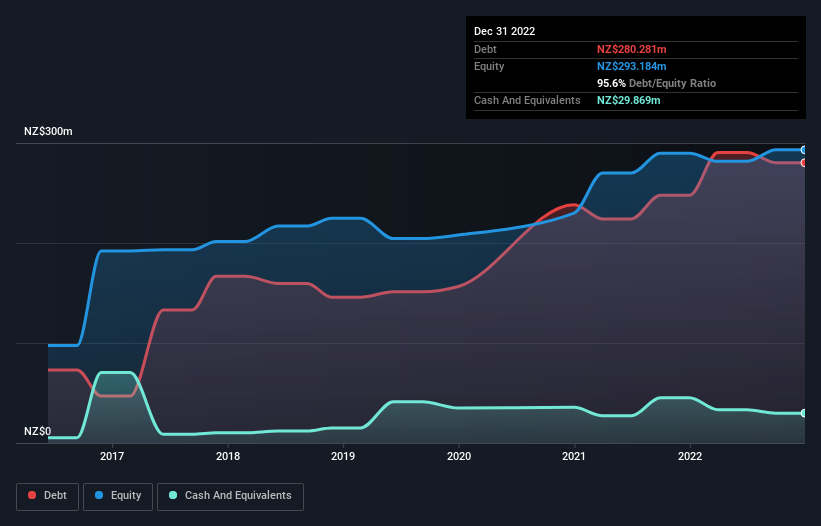- New Zealand
- /
- Hospitality
- /
- NZSE:RBD
These 4 Measures Indicate That Restaurant Brands New Zealand (NZSE:RBD) Is Using Debt Extensively

The external fund manager backed by Berkshire Hathaway's Charlie Munger, Li Lu, makes no bones about it when he says 'The biggest investment risk is not the volatility of prices, but whether you will suffer a permanent loss of capital.' So it might be obvious that you need to consider debt, when you think about how risky any given stock is, because too much debt can sink a company. We note that Restaurant Brands New Zealand Limited (NZSE:RBD) does have debt on its balance sheet. But should shareholders be worried about its use of debt?
When Is Debt Dangerous?
Generally speaking, debt only becomes a real problem when a company can't easily pay it off, either by raising capital or with its own cash flow. If things get really bad, the lenders can take control of the business. While that is not too common, we often do see indebted companies permanently diluting shareholders because lenders force them to raise capital at a distressed price. Of course, the upside of debt is that it often represents cheap capital, especially when it replaces dilution in a company with the ability to reinvest at high rates of return. When we examine debt levels, we first consider both cash and debt levels, together.
See our latest analysis for Restaurant Brands New Zealand
What Is Restaurant Brands New Zealand's Net Debt?
As you can see below, at the end of December 2022, Restaurant Brands New Zealand had NZ$280.3m of debt, up from NZ$247.8m a year ago. Click the image for more detail. However, it does have NZ$29.9m in cash offsetting this, leading to net debt of about NZ$250.4m.

A Look At Restaurant Brands New Zealand's Liabilities
Zooming in on the latest balance sheet data, we can see that Restaurant Brands New Zealand had liabilities of NZ$152.8m due within 12 months and liabilities of NZ$971.3m due beyond that. Offsetting these obligations, it had cash of NZ$29.9m as well as receivables valued at NZ$19.1m due within 12 months. So it has liabilities totalling NZ$1.08b more than its cash and near-term receivables, combined.
Given this deficit is actually higher than the company's market capitalization of NZ$810.9m, we think shareholders really should watch Restaurant Brands New Zealand's debt levels, like a parent watching their child ride a bike for the first time. Hypothetically, extremely heavy dilution would be required if the company were forced to pay down its liabilities by raising capital at the current share price.
We use two main ratios to inform us about debt levels relative to earnings. The first is net debt divided by earnings before interest, tax, depreciation, and amortization (EBITDA), while the second is how many times its earnings before interest and tax (EBIT) covers its interest expense (or its interest cover, for short). Thus we consider debt relative to earnings both with and without depreciation and amortization expenses.
Even though Restaurant Brands New Zealand's debt is only 1.8, its interest cover is really very low at 2.0. This does have us wondering if the company pays high interest because it is considered risky. Either way there's no doubt the stock is using meaningful leverage. Sadly, Restaurant Brands New Zealand's EBIT actually dropped 5.4% in the last year. If earnings continue on that decline then managing that debt will be difficult like delivering hot soup on a unicycle. When analysing debt levels, the balance sheet is the obvious place to start. But it is future earnings, more than anything, that will determine Restaurant Brands New Zealand's ability to maintain a healthy balance sheet going forward. So if you want to see what the professionals think, you might find this free report on analyst profit forecasts to be interesting.
But our final consideration is also important, because a company cannot pay debt with paper profits; it needs cold hard cash. So the logical step is to look at the proportion of that EBIT that is matched by actual free cash flow. Over the most recent three years, Restaurant Brands New Zealand recorded free cash flow worth 50% of its EBIT, which is around normal, given free cash flow excludes interest and tax. This free cash flow puts the company in a good position to pay down debt, when appropriate.
Our View
To be frank both Restaurant Brands New Zealand's level of total liabilities and its track record of covering its interest expense with its EBIT make us rather uncomfortable with its debt levels. Having said that, its ability to convert EBIT to free cash flow isn't such a worry. Overall, it seems to us that Restaurant Brands New Zealand's balance sheet is really quite a risk to the business. So we're almost as wary of this stock as a hungry kitten is about falling into its owner's fish pond: once bitten, twice shy, as they say. The balance sheet is clearly the area to focus on when you are analysing debt. However, not all investment risk resides within the balance sheet - far from it. These risks can be hard to spot. Every company has them, and we've spotted 3 warning signs for Restaurant Brands New Zealand (of which 1 is a bit concerning!) you should know about.
If, after all that, you're more interested in a fast growing company with a rock-solid balance sheet, then check out our list of net cash growth stocks without delay.
New: AI Stock Screener & Alerts
Our new AI Stock Screener scans the market every day to uncover opportunities.
• Dividend Powerhouses (3%+ Yield)
• Undervalued Small Caps with Insider Buying
• High growth Tech and AI Companies
Or build your own from over 50 metrics.
Have feedback on this article? Concerned about the content? Get in touch with us directly. Alternatively, email editorial-team (at) simplywallst.com.
This article by Simply Wall St is general in nature. We provide commentary based on historical data and analyst forecasts only using an unbiased methodology and our articles are not intended to be financial advice. It does not constitute a recommendation to buy or sell any stock, and does not take account of your objectives, or your financial situation. We aim to bring you long-term focused analysis driven by fundamental data. Note that our analysis may not factor in the latest price-sensitive company announcements or qualitative material. Simply Wall St has no position in any stocks mentioned.
About NZSE:RBD
Restaurant Brands New Zealand
Operates quick service and takeaway restaurants in New Zealand, Australia, California, Hawaii, Saipan, and Guam.
Good value with proven track record.
Market Insights
Community Narratives




